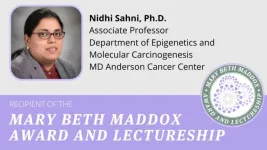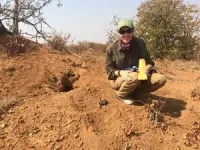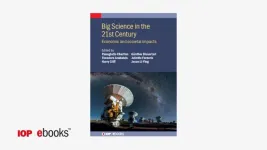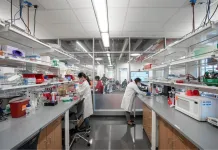(Press-News.org) AUSTIN/HOUSTON – TAMEST (Texas Academy of Medicine, Engineering, Science and Technology) has announced Nidhi Sahni, Ph.D., The University of Texas MD Anderson Cancer Center, as the recipient of the 2024 Mary Beth Maddox Award and Lectureship in cancer research. She was chosen for her role in identifying novel biomarkers and drug targets, which are expected to have a significant impact on cancer by translating into more effective prognosis and therapy for the disease.
The Mary Beth Maddox Award and Lectureship recognizes women scientists in Texas bringing new ideas and innovations to the fight against cancer. It was established in 2022 in honor of Mary Beth Maddox, former Executive Director of TAMEST, who passed away after a valiant battle with pancreatic cancer.
Dr. Sahni is an Associate Professor in the Department of Epigenetics and Molecular Carcinogenesis at MD Anderson. She pioneered "functional variomics" as an approach to identify mechanisms by which DNA sequence variation impacts diseases, establishing a new field with major impact on precision oncology, early detection and therapeutics in cancer.
Dr. Sahni’s research program involves a combination of experimental and computational biology that focuses on genotype and phenotype relationships in cancer. Her work has led to better understanding of signal transduction networks through which chemical signals are transmitted through the cell as a series of molecular events, and how these events impact the biological characteristics of the cell. She has a broad background in systems biology, bioinformatics and human genetics and her research findings establish that in stark contrast to common genetic variants, disease-causing mutations tend to perturb molecular interactions in signaling networks, shaping cellular properties.
Her lab is focused on the systems biology of human cancer and integrates high-throughput experimental platforms with large-scale computational genomics to address fundamental problems in the modern era of personalized or precision medicine. She seeks a systems-level understanding of the underlying genetic and epigenetic irregularities in cancer heterogeneity and immunity. Her research is helping to build a systematic and quantitative understanding of molecular mechanisms in cancer.
"Dr. Sahni is an interdisciplinary leader in systems biology and computational medicine and has made unique, original and significant contributions to cancer research by seeking to understand a fundamental question in biology, namely the genotype-phenotype relationships in cancer,” said Nominator and TAMEST Member Anil K. Sood, M.D. (NAM), MD Anderson. “The novel biomarkers and drug targets her work has identified will truly transform outcomes for cancer patients and I am thrilled the Mary Beth Maddox Award committee agrees that she is deserving of this honor.”
“It’s unusual to find someone with Dr. Sahni’s computational skills who can also use experimental biology to define new molecular mechanisms in cancer cell biology,” said Mary Beth Maddox Committee Chair Ralph J. DeBerardinis, M.D., Ph.D. (NAM), UT Southwestern Medical Center. “She has already made many contributions to our understanding of complex signal transduction networks, and the committee feels that Dr. Sahni’s focus and trajectory are exactly what the Mary Beth Maddox Awards seeks to recognize. We cannot wait to see how discoveries will influence cancer outcomes in the years to come.”
Dr. Sahni will be honored at the TAMEST 2024 Annual Conference, where she will present her research to attendees and also receive a $5,000 honorarium and award. The conference will be held February 5–7, 2024, at the AT&T Hotel and Conference Center in Austin, Texas.
In addition to being honored at the TAMEST Annual Conference, Dr. Sahni will promote her work and discoveries across the state at established lecture and seminar series at TAMEST member institutions with NIH National Cancer Institute Designated Cancer Centers:
Dan L Duncan Comprehensive Cancer Center, Baylor College of Medicine
John H. Blaffer Lecture Series, MD Anderson Cancer Center
Mays Cancer Center Grand Rounds, UT Health San Antonio
Harold C. Simmons Comprehensive Cancer Center, UT Southwestern Medical Center
The award covers the recipient’s travel and lodging for the lectures and includes organized visits and networking at the NCI Cancer Centers.
###
About TAMEST:
TAMEST (Texas Academy of Medicine, Engineering, Science and Technology) was co-founded in 2004 by the Honorable Kay Bailey Hutchison and Nobel Laureates Michael S. Brown, M.D., and Richard E. Smalley, Ph.D. With more than 335 members, 8 Nobel Laureates and 22 member institutions, TAMEST is composed of Texas-based members of the three National Academies (National Academy of Medicine, National Academy of Engineering and National Academy of Sciences) and other honorific organizations. We bring together the state’s brightest minds in medicine, engineering, science and technology to foster collaboration, and to advance research, innovation and business in Texas.
TAMEST’s unique interdisciplinary model has become an effective recruitment tool for top research and development centers across Texas. Since our founding, more than 275 TAMEST members have been inducted into the National Academies or recruited to Texas.
END
A new landmark study involving 281 elite athletes from Australia and Belgium has revealed one in six have measures that would normally suggest reduced heart function.
Genetic analysis published in Circulation conducted by scientists in Australia and Belgium revealed those athletes also had an enrichment of genes associated with heart muscle disease.
Thus, a genetic predisposition may be ‘stressed’ by exercise to cause profound heart changes. The international collaboration will continue to monitor the athletes over the long-term to determine the consequences on their heart health.
Associate Professor Andre la Gerche, who heads the HEART Laboratory that is jointly ...
Tempe, Ariz., December 18, 2023 – Extreme heat waves, once considered rare, are now frequent and severe in cities due to climate change. Phoenix faced such a brutal heat wave in July of 2023 when it endured 31 consecutive days of high temperatures of at least 110 F. The severity of the heat wave triggered a state of emergency. In June of 2021, the town of Lytton, B.C., Canada, hit a blistering 121 F, leading to a fire that burnt most of the village. This pattern repeated in Europe in 2022, where heat caused fatal illnesses, wildfires and damaged infrastructure, highlighting ...
Scientists looking to uncover the mysteries of the underwater world have more valuable information at their fingertips thanks to an international team that has produced an inventory of species confirmed or expected to produce sound underwater.
Led by Audrey Looby from the University of Florida Department of Fisheries and Aquatic Sciences, the Global Library of Underwater Biological Sounds working group collaborated with the World Register of Marine Species to document 729 aquatic mammals, other tetrapods, fishes, and invertebrates that produce active or passive sounds. In addition, the inventory includes another 21,911 species that ...
Led by Aoxing Liu and senior authors Melinda Mills, Andrea Ganna and an international team, the study examined the link between 414 early-life diseases and lifetime childlessness in over 2.5 million individuals born in Finland and Sweden.
In many Western European and East Asian countries, up to 15-20% of individuals born around 1970 are now childless. Although multiple social, economic and individual preferences have been studied, there has been limited research examining the contribution of different diseases to being childless over a lifetime, particularly those diseases with onset prior to the peak reproductive age.
Dr Aoxing Liu, lead author ...
CORVALLIS, Ore. – Some coral species can be resilient to marine heat waves by “remembering” how they lived through previous ones, research by Oregon State University scientists suggests.
The study, funded by the National Science Foundation, also contains evidence that the ecological memory response is likely linked to the microbial communities that dwell among the corals.
The findings, published today in Global Change Biology, are important because coral reefs, crucial to the functioning ...
IOP Publishing is proud to announce the release of ‘Big Science in the 21st Century’, a comprehensive exploration of the impact of Big Science on our society and the new perspectives it opens on evaluating its societal benefits.
Authored by a diverse group of contributors, the book offers a multifaceted view of the challenges, merits, and transformations of Big Science across different disciplines and geographical boundaries. It delves into the transformative role of Big Science in shaping the world we live in, from its historical roots in the aftermath of the Second World War to its contemporary ...
In a spectacular new study, researchers from the University of Copenhagen have used light and chlorine to eradicate low-concentration methane from air. The result gets us closer to being able to remove greenhouse gases from livestock housing, biogas production plants and wastewater treatment plants to benefit the climate. The research has just been published in the journal Environmental Research Letters.
The Intergovernmental Panel on Climate Change (IPCC) has determined that reducing methane gas emissions will immediately reduce the rise in global temperatures. The gas is up to 85 times more potent ...
With more of us looking for alternatives to eating animals, new research has found a surprising environmentally friendly source of protein – algae.
The University of Exeter study has been published in The Journal of Nutrition and is the first of its kind to demonstrate that the ingestion of two of the most commercially available algal species are rich in protein which supports muscle remodeling in young healthy adults. Their findings suggest that algae may be an interesting and sustainable alternative to animal-derived protein with respect to maintaining and building muscle.
Researcher Ino Van Der Heijden ...
Funding an unconventional approach to fighting cancer that emphasizes the integration of diverse scientific disciplines, the U.S. Department of Defense has awarded $3.2 million to establish the Convergent Science Cancer Consortium (CSCC), led by Dean’s Professor of Biological Sciences Peter Kuhn at the USC Dornsife College of Letters, Arts and Sciences.
The consortium, which includes Stanford University, Cedars-Sinai Medical Center and Children’s Hospital Los Angeles as inaugural members, unites experts from fields such as biology, engineering, mathematics and computer science, to discover more effective treatment strategies ...
Results from a phase II clinical trial indicate that psilocybin, a hallucinogenic chemical found in certain mushrooms of the genus Psiloybe, may benefit individuals with cancer and major depression. Trial participants treated with psilocybin not only experienced a lessening of depressive symptoms but also spoke highly of the therapy when interviewed at the end of the trial. The findings are published by Wiley in two articles appearing online in CANCER, a peer-reviewed journal of the American Cancer Society.
By binding to a specific subtype of serotonin receptor in the brain, psilocybin can cause alterations to mood, ...







